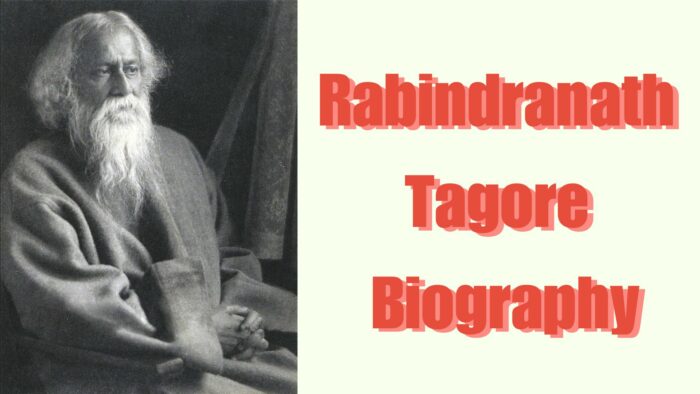
Rabindranath Tagore Biography : A Simply Great Depiction In 2023
Rabindranath Tagore biography is depicted sharply here with simple aspects of his more like a composition. Rabindranath Tagore is a name that resonates with creativity, poetry, and innovation. Born on May 7, 1861, in Calcutta, India, Tagore rose to prominence as a polymath – an accomplished poet, philosopher, musician, artist, and playwright. His contributions to literature and culture have left an indelible mark on the world,
making him one of the most celebrated figures in Indian history. Tagore’s journey began with a deep-rooted connection to his homeland, Bengal. His writings, rich in emotion and vivid imagery, captured the essence of Bengal’s culture,
traditions, and spirituality. However, his influence extended far beyond regional boundaries, earning him the prestigious Nobel Prize in Literature in 1913. Through his timeless works, Tagore continues to inspire and enlighten readers, ensuring that his legacy remains etched in the annals of literary greatness.
Rabindranath Tagore Biography
Who was Rabindranath Tagore?
when depicting Rabindranath Tagore biography, we need to discuss his personal life and where he came from. Rabindranath Tagore was a renowned poet, philosopher, and polymath from India. He was born on May 7, 1861, in Calcutta (now Kolkata), West Bengal, India. Tagore was the youngest son of Debendranath Tagore, a leader of the Brahmo Samaj, a religious and social reform movement in 19th-century Bengal.
He was a prominent figure in the Bengal Renaissance, which saw a flourishing of art, literature, and social reform in the region. Tagore became the first non-European to win the Nobel Prize in Literature in 1913, primarily for his collection of poems called “Gitanjali” (Song Offerings).
In addition to being a poet, Tagore was also a playwright, novelist, essayist, musician, and painter. He was a versatile artist who explored various themes and styles in his works, including love, nature, spirituality, and social issues. Tagore’s writings often reflected his deep connection to his homeland and its cultural heritage.
He played a significant role in shaping modern Indian literature and was a prominent advocate for the independence movement in India. Tagore’s contributions to literature and his social and political activism continue to inspire people around the world.
What are some notable works by Rabindranath Tagore?
Rabindranath Tagore’s literary repertoire is vast and diverse, comprising poetry, songs, plays, novels, and essays. Some of his most notable works include “Gitanjali” (Song Offerings), “Gora,” “Chokher Bali” (A Grain of Sand), “The Home and the World,” and “Kabuliwala,”
“Gitanjali” brought Tagore international recognition and was a collection of his poems that were translated into English. It showcased his poetic brilliance and deeply philosophical outlook on life. Another significant work, “Gora,” is a novel that explores themes of identity, religion, and social reform.
It examines the clash between traditional Hindu customs and the influence of British colonialism in India. “Chokher Bali” is a thought-provoking novel that delves into the complexities of love, marriage, and societal expectations.
Tagore’s plays, such as “The Post Office” and “Red Oleanders,” were groundbreaking in their use of symbolism and explored themes of human suffering and liberation. His writings often reflected his concern for social issues such as women’s rights, education, and poverty.
Tagore’s works continue to be celebrated for their profound insights, lyrical beauty, and universal appeal. They have been translated into numerous languages and have left an indelible mark on world literature. In conclusion, Rabindranath Tagore’s biography is a testament to his remarkable life and accomplishments.
From his early years as a poet and writer to his later role as a social reformer and philosopher, Tagore’s contributions to literature, music, and education have left an indelible mark on the world.
Tagore’s poetic genius is evident in his vast collection of poems and songs, which have resonated with readers and listeners across generations. His ability to capture the essence of human emotions and experiences has made him a beloved figure in the literary world. His work continues to inspire and touch the hearts of millions around the globe.
Furthermore, Tagore’s commitment to social change and education is truly commendable. He founded the Visva-Bharati University, which aimed to create a harmonious learning environment that combined the best of Eastern and Western philosophies. This institution continues to foster creativity, critical thinking, and cultural exchange, reflecting Tagore’s vision of a better world.
In conclusion, Rabindranath Tagore biography is a testament to his unparalleled talents and his unwavering dedication to art, literature, and education. His impact on the world is immeasurable, and his legacy will continue to inspire generations to come.
Related Posts

50 Best Bengali Short Story Books
Are you a fan of short stories? Look no further! In this article, we h...

50 Best Bengali History Books
In this article, we will present a curated list of the 50 best Bengali...

Why Did Bangladesh Separate From Pakistan: The Best Tailored Discussion 2023
Why Did Bangladesh Separate From Pakistan is a significant event in th...

Operation Searchlight: The Worst Part In The History Of Bangladesh 1971
Operation Searchlight, a military crackdown launched by the Pakistani ...
Write your thoughts in our old fashioned Comment
EBook Comment/Review Policy. We strongly recommend leaving comments, however comments with abusive words, bullying, personal attacks of any type will be moderated.
Review Rabindranath Tagore Biography : A Simply Great Depiction In 2023.